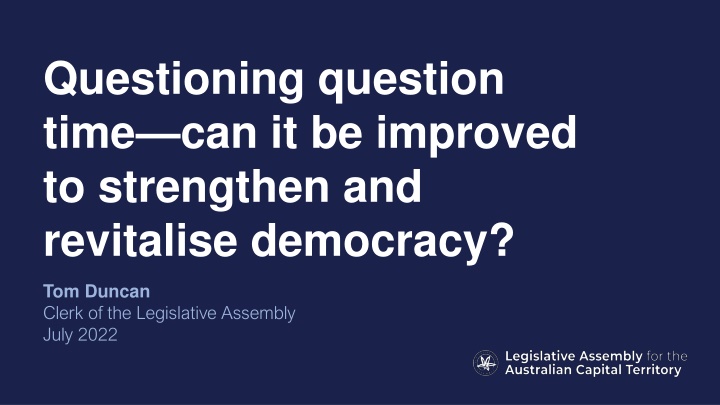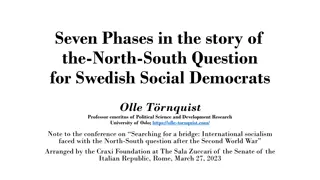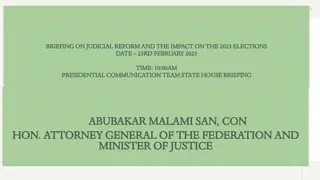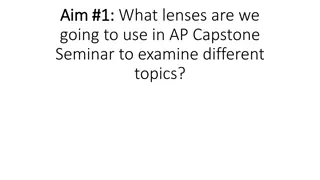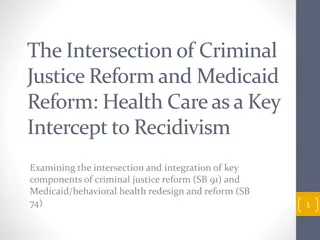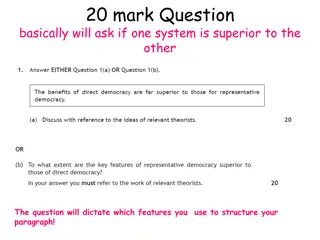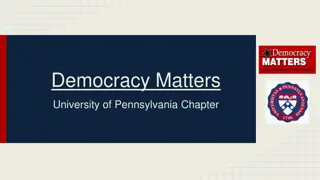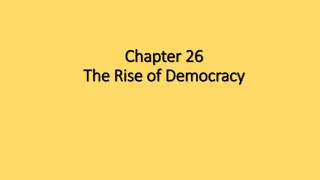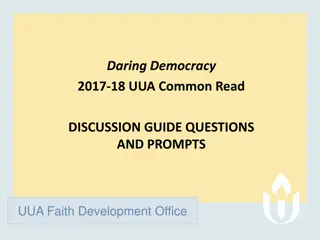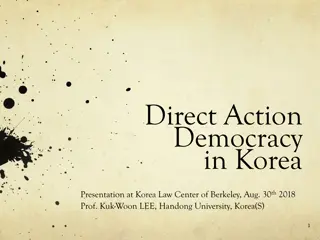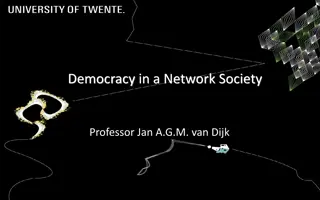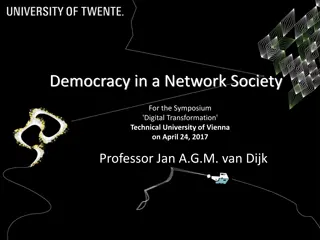Strengthening Democracy Through Question Time Reform
Strengthening and revitalizing democracy through improvements in question time is crucial, especially in light of declining trust in government and satisfaction with democracy. Calls for eliminating scripted government questions, like Dorothy Dixers, in favor of promoting genuine accountability and transparency during Question Time have been highlighted. Reforms are deemed necessary to enhance the public interest and governance efficacy.
Download Presentation

Please find below an Image/Link to download the presentation.
The content on the website is provided AS IS for your information and personal use only. It may not be sold, licensed, or shared on other websites without obtaining consent from the author.If you encounter any issues during the download, it is possible that the publisher has removed the file from their server.
You are allowed to download the files provided on this website for personal or commercial use, subject to the condition that they are used lawfully. All files are the property of their respective owners.
The content on the website is provided AS IS for your information and personal use only. It may not be sold, licensed, or shared on other websites without obtaining consent from the author.
E N D
Presentation Transcript
Questioning question time can it be improved to strengthen and revitalise democracy? Tom Duncan Clerk of the Legislative Assembly July 2022
Is our democracy broken? Is our democracy broken? Trust in Government is at an historic low while satisfaction Trust in Government is at an historic low while satisfaction with democracy is at its lowest level in 40 years. People don t with democracy is at its lowest level in 40 years. People don t believe the Government is run for all people, or can be believe the Government is run for all people, or can be trusted to do the right thing. trusted to do the right thing. Is our democracy broken?, Analysis, Australian Election Study, 21 July 2021 https://whataustraliathinks.org.au/data_story/is-our-democracy-broken/ Finally, Australia s ability to constantly refine and improve its Finally, Australia s ability to constantly refine and improve its own democracy has impacts on its standing, and consequently, own democracy has impacts on its standing, and consequently, for Australian efforts to promote democracy in the region. for Australian efforts to promote democracy in the region. The risks to Australia s democracy, Brookings Institute, 22 January 2021
No Dorothy Dixers No questions and answers scripted by ministerial staffers, with the exercise only seen to serve the purposes of talking up the Government berating the Opposition and wasting time D D o o r r o o t t h h y y D D ii x x e e r r s s The Dorothy Dixer questions are to any objective observer next to useless. Too often the questions from members do not even feign a passionate concern on behalf of their constituents. This is an indication to the general public that the members are not even trying to argue for their constituents. There is another key reason why Dorothy Dixers should be done away with. They are just so silly. Questions asking Ministers about the wonderful virtues of a particular policy is an obviously bad type of question. It is even worse when a question asks how a particular government policy benefits a Member's electorate. From my observance of Question Time, Dorothy Dixer questions could simply be emailed to the relevant Minister or Ministers. This would be much more efficient The measure of the flaccidity of the questions and their lack of genuine enquiry is the eagerness of the Ministers to present to the Despatch Box. This is no earnest exploration of politically sensitive issues and matters of public importance warranting honest explanation this is performance. In my opinion Question Time is not the time for the government to trumpet their own achievements or lack thereof. It is a time for the Opposition and Crossbench Members to question the government about their efficacy and governance. Furthermore, it allows the general public the opportunity to analyse the responses by government Ministers, their competency, transparency and accountability, or lack thereof. No more Dorothy Dixers . Question Time should be about accountability, not stump speeches. Extracts from submissions to the House of Representatives Standing Committee on Procedure Inquiry into the practices procedures relating to question time.
Change the standing orders to improve the purpose of the question. Require that it serves the public interest, not the party. The best way to do this would be to get rid of government questions (Dorothy Dixers). Only have questions from the Opposition and/or crossbenchers. I would like to see Dixers eliminated from Question Time, removing the opportunity for the government of the day to use this valuable time for self-promotion. Ministers can issue media releases or conduct media interviews if they want to self-promote. I believe Question Time should be exclusively for the Members of the Opposition and Crossbench to question the government s Ministers about their governance. D D o o r r o o t t h h y y D D ii x x e e r r s s c o n t i n u e d It is clear that these questions are not designed to make the government accountable, but rather to give Ministers an opportunity to outline their achievements, or to point out failings of the Opposition. Dorothy Dixers they are embarrassing and unedifying. Scrap them. It is QUESTION TIME Dorothy Dixers: Currently, these are a waste of time. Members have responsibilities not only to their party (if aligned to a party) but also to their constituency and to the House itself. To remove or at least ameliorate the corrosive influence of Dorothy Dixers . Dorothy Dixers should be abolished as they completely skew opportunities for scrutiny OF the executive to advantages FOR the executive to avoid such scrutiny while attempting to scrutinise the opposition. This type of questioning is very off putting, lacks credibility and does nothing for the general public s acceptance of the value places on the time of parliament. Extracts from submissions to the House of Representatives Standing Committee on Procedure Inquiry into the practices procedures relating to question time.
it is the House, through its Members, which decides the way the House operates. Although the problems we are facing with Question Time have been with us for a number of years, the House has not been prepared to accept its responsibilities. Instead, members have consistently placed the blame for the inadequacies of the system on the Chair, when the responsibility lies solely with the House, and the House alone. I now place the matter in the hands of the House, where it squarely belongs. Hon Joan Child, AO, 22 October 1986 Hon Joan Child, AO, 22 October 1986
Graph 1: Are there enough questions being asked each sitting day? Graph 1: Are there enough questions being asked each sitting day? 60 50 40 total number of questions 30 20 10 0 TAS - HoA NT NSW - LA VIC - LC WA - LA QLD VIC - LA NSW - LCSA - HoA HoR SA - LC WA - LC SENATE ACT NZ Original Questions Supplementary Questions
Graph 2: How many questions are asked by non Graph 2: How many questions are asked by non- -government members each sitting day? sitting day? government members each 40 35 30 25 total number of questions 20 15 10 5 0 NT NSW - LA HoR QLD TAS - HoA WA - LA NSW - LC VIC - LA VIC - LC SA - LC SA - HoA SENATE WA - LC NZ ACT Non-Government Government
Graph 3: How long does a minister have to answer questions without notice? Graph 3: How long does a minister have to answer questions without notice? 4.5 4 3.5 3 2.5 minutes no time limits no time limits 2 1.5 1 0.5 0 SENATE ACT VIC - LA NSW - LC NT VIC - LC HoR QLD NSW - LA SA - HoA NZ WA - LA SA - LC TAS - HoA WA - LC Original Questions Supp Questions NSW LA At the discretion of the Speaker, the time for answers can be extended by two (2) minutes
Graph 4A: On average, how many questions does each minister receive during Graph 4A: On average, how many questions does each minister receive during question time? (Lower Houses) question time? (Lower Houses) 6 5 4 number of questions 3 2 1 0 VIC - LA HoR QLD WA - LA NSW - LA SA - HoA NZ TAS - HoA NT ACT
Graph 4B: On average, how many questions does each minister receive during Graph 4B: On average, how many questions does each minister receive during question time? (Upper Houses) question time? (Upper Houses) 14 12 10 number of questions 8 6 4 2 0 NSW - LC VIC - LC SENATE WA - LC SA - LC
Graph 5: Is there enough time allocated to question time each sitting day? Graph 5: Is there enough time allocated to question time each sitting day? 90 80 70 60 50 minutes 40 30 20 10 0 WA - LC VIC - LC VIC - LC WA - LA NSW - LA QLD SA - HoA SA - LC NT SENATE ACT TAS - HoA NZ NSW - LC HoR New Zealand figure based on information provided in 2011.
Table 1: Is the Deputy Presiding Officer from a different political than the Table 1: Is the Deputy Presiding Officer from a different political than the Presiding Officer? Presiding Officer? Legislature Legislature Deputy Presiding Deputy Presiding Officer Officer from same political from same political party as Presiding Officer as Presiding Officer party Australian Capital Territory Legislative Assembly Yes Yes New South Wales Legislative Assembly No No New South Wales Legislative Council No No New Zealand House of Representatives No No Northern Territory Legislative Assembly No No Queensland Legislative Assembly No No South Australia House of Assembly Yes Yes* * Tasmania House of Assembly No No Tasmania Legislative Council Yes Yes Victoria Legislative Assembly No No Legislative Council Yes* Yes* Western Australia Legislative Assembly No No Western Australia Legislative Council Yes Yes * Speaker is from non-government party
Table 2: Are the occupants of the chair from different parties? Table 2: Are the occupants of the chair from different parties? Legislature Legislature Percentage of non Percentage of non- -government members on government members on Presiding Officer s panel Presiding Officer s panel Western Australia Legislative Assembly 0% Victoria Legislative Assembly 16% Western Australia Legislative Council 40% Australian Capital Territory Legislative Assembly 50% New Zealand House of Representatives 50% New South Wales Legislative Assembly 60% New South Wales Legislative Council 75% Tasmania Legislative Council 100%
Table 3: Does a non Table 3: Does a non- -government member chair the public accounts committee? government member chair the public accounts committee? Legislature Legislature Non Non- -government chair government chair Australian Capital Territory Legislative Assembly Yes Yes New South Wales Legislative Assembly* * Yes Yes Tasmania Legislative Council* * Yes Yes New Zealand House of Representatives# # No No Northern Territory Legislative Assembly No No Queensland Legislative Assembly+ + No No South Australia House of Assembly^ ^ No No Victoria Legislative Assembly* * Yes Yes Western Australia Legislative Assembly No No * Joint committee # Finance and Expenditure Committee + Economics and Governance Committee ^ Economic and Finance Committee
If I had a blank page and could design the ideal question time If I had a blank page and could design the ideal question time One hour every sitting day with 15 original questions and 15 supplementary questions all from non-government members Followed by 30 minutes each sitting day for 10 constituency questions, equally divided between government and non-government members A standing order similar to that which currently exists in the Victorian Legislative Council that allows the Presiding Officer to require the question be answered. Victoria Legislative Council, standing order 8.07, paragraph 2 Victoria Legislative Council, standing order 8.07, paragraph 2 (2) The President may determine that an answer to an oral question without notice or supplementary question is not responsive to the question, and may accordingly direct the Minister to provide a written response to the question and lodge it with the clerk.
parliament.gov.au /actassembly @act_assembly @actassembly
